The Internet has its 40th birthday next year!
And I bet you that people in 1983 had no idea the web was gonna take over our world to the extent it did. Yet, today, there are over 5,300,000,000 internet users worldwide, and the average American spends about 23 hours a week on social media alone!
Because of that and other factors, digital technology is starting to rewire our brains causing cognitive disorders.
What are those disorders and how does the web affect us? We conducted a study to find out.
Now—
We live in the age of the network society.
What does that mean?
It’s a society with no spatial barriers where the world has become a global village. Social media networks removed the traditional limits on communication and changed how we see society. We are constantly plugged in, connected, and available online. With this change in society where individuals are always connected come many questions regarding our health and happiness.
So, how exactly does technology affect us and our lives?
Major findings: how technology has changed our lives
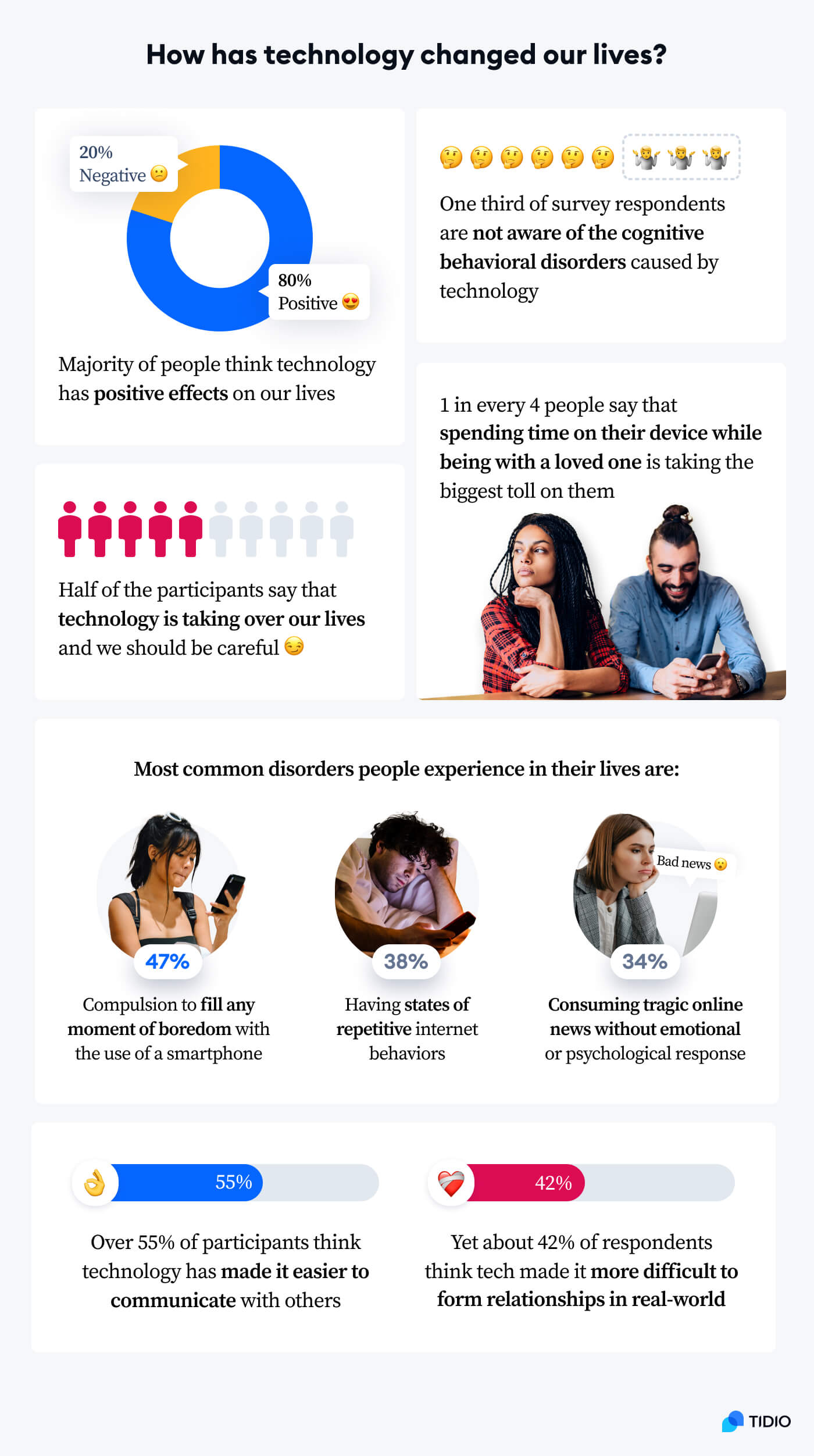
Let’s consider the toll technology takes on our lives.
Negative impacts of technology on our mental health
We all know that the internet can be a dangerous place. With so much information at our fingertips, it’s easy to get lost in a sea of websites, social media posts, and videos.
For some people, this online overload can lead to cognitive disorders and other mental health issues. According to our study, the biggest five negative effects of technology on our lives include:
- Psychological issues (50%)
- Sleep problems (48%)
- Social issues (45%)
- Difficulty forming relationships in the real-world (42%)
- Difficulty with focus (41%)
The most important aspect that people notice are psychological problems.
The most prevalent cognitive disorders induced by technology that the participants of our study recognized in themselves were:
- The compulsion to fill any momentary boredom with the use of a smartphone (47%)
- Having states of mechanical, routined, and repetitive internet behaviors (38%)
- Consuming tragic online news without emotional or psychological response or impact (34%)
- Spending time on their device when being with their loved ones and giving it more attention than to the people (32%)
These problems mainly affect young people who spend more time online than older generations. We can see that from the result of our study. Gen Z internet users were 20% less likely than other generations to say that technology positively impacts our lives.
So—
What are the most common mental health problems and cognitive disorders caused by modern technologies?
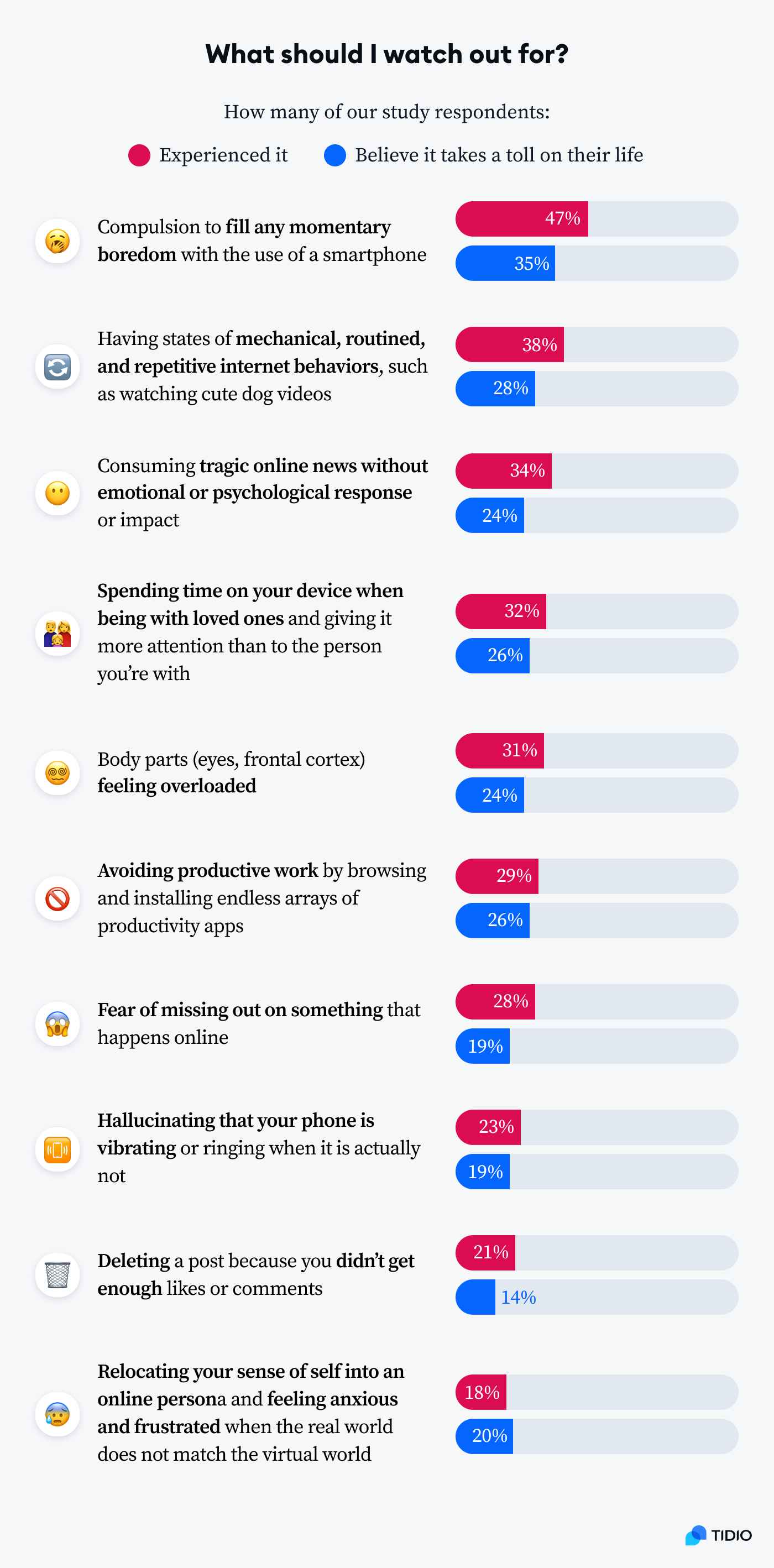
What about you? How many of these disorders do you recognize in yourself?
Tech-Induced Mental Disorders Quiz
Let’s give a little explanation on some of the mental and cognitive disorders that are caused by modern technology, shall we?
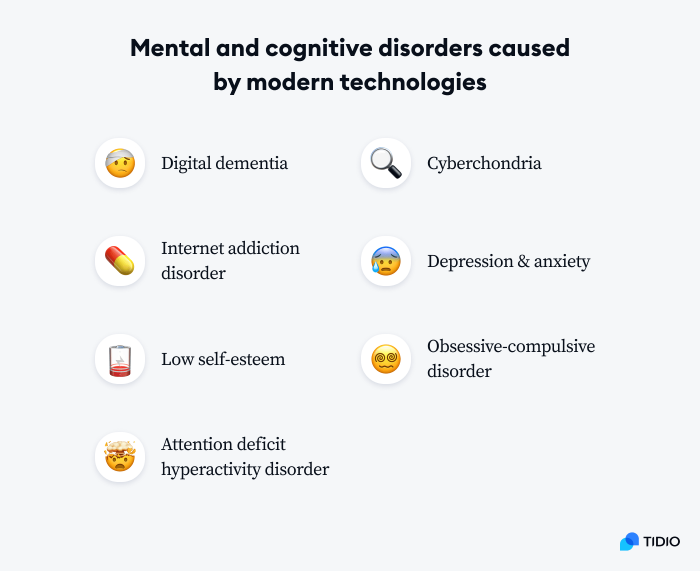
| Mental and cognitive disorders caused by modern technologies | Definition |
|---|---|
| Digital dementia | People with digital dementia may have trouble focusing or remembering information that they have read online or seen in videos. |
| Cyberchondria | It is characterized by anxiety and paranoia about one’s health. People with cyberchondria may search the internet for information about their symptoms and health concerns. |
| Internet addiction disorder | People with internet addiction disorder may spend excessive amounts of time online, to the point that it interferes with their work, school, or personal relationships. |
| Depression & anxiety | It is hard to tell whether or not the internet can cause depression and anxiety. However, there is evidence to suggest that it can worsen existing mental health conditions. |
| Low self-esteem | A study published in the journal JAMA Pediatrics found that teenagers who spend more than three hours a day on social media are more likely to have poor mental health, including low self-esteem. |
| Obsessive-Compulsive Disorder | If you obsessively check your social media notifications or spend hours online gaming, you may be at risk of developing OCD. This can lead to real-life problems, such as problems with your school or job performance as well as social isolation. |
| Attention Deficit Hyperactivity Disorder | We don’t know whether or not overuse of the internet can lead to developing Attention Deficit Hyperactivity Disorder (ADHD), as more research is needed in this area. However, there are some studies that suggest a correlation between the two. |
The discussion over the negative effects of technology on our mental health has been happening for years now.
Previous studies show that being overly connected causes psychological issues like depression, unhealthy expectations, and concentration issues. Technology can also have negative repercussions on physical health. Overuse of modern technology can lead to vision problems, hearing loss, and neck strain.
The frequent use of digital technology can even heighten ADHD symptoms and interfere with emotional and social intelligence. This can lead to addictive behaviors, increased social isolation, and interferences with brain development and sleep. But, some online tools provide mental exercises that offer brain-health benefits, including integrating mental health video chats. The benefits include activating neural circuitry, improving cognitive functioning, reducing anxiety, and increasing restful sleep.
Some researchers argue that the most dramatic impact of technology on our lives is the reduction in the amount of sleep. About 50 years ago, an average adult slept for around 8.5 hours a night. Now, this averages at around 7 hours a night. This is because bright light reduces levels of melatonin, a hormone that regulates sleep.
Our study found that most people (68%) are worried about how disorders caused by technology affect their lives. About 50% of respondents think that technological changes in the world are normal, but many think we should be careful about the way it’s affecting our behavior.
So how do we counteract that?
Counteract and mitigate the effects of technology: tips
About 67% of participants of our study are aware that some of their behaviors are classified as cognitive disorders caused by technology. And they are willing to change and control their tech habits.
However, people who didn’t perceive their symptoms as disorders were almost twice less likely to take any steps to override the habits caused by technology. Over 82% of respondents who recognized some of their compulsive behaviors as disorders were doing something to change their habits. This applied to only 53% of respondents who didn’t know their experiences may lead to mental health issues.
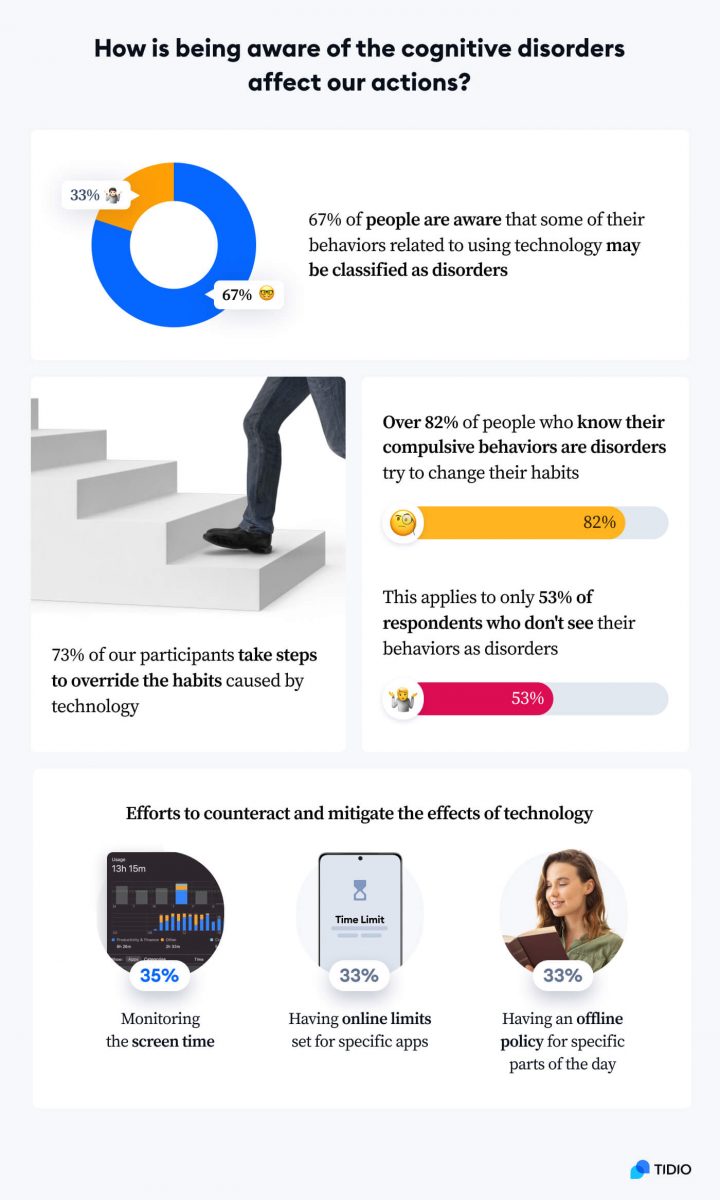
Some of the ways our respondents presented for mitigating the effects of tech on their lives include:
- Monitoring the time spent in front of a screen
- Having offline-only policy for specific parts of the day
- Having an online time limits set for specific apps
- Working on mental stability and well-being, together with focusing more time of the day on more productive activities (making music, sports, walking)
- Having a rule of not interacting with a phone when with a person
- Having a policy of no laptop after work
- Spending more time with people
- Not using as much social media
- Making sure to take longer breaks from technology every now and then
- Only using technology for a certain purpose(s) and being fully aware of it
- Having a rule of never starting or ending a day with a technological device
These are just a few of the ways you can use to counteract and mitigate the effects of technology. Everyone is different, and you need to find practices that work for you. The best method, in this case, is trial and error. Try as many tactics as it takes for you to find the right way to keep a healthy relationship with technology.
Technology is affecting our lives. There is no denying that. But what exactly is it affecting?
How does digital technology affect our lives?
Well—according to our respondents, it’s affecting the way we communicate (52%), the way we see privacy (42%), and our culture in general (41%).
So pretty much every sphere of life is affected by technology. We can’t help but change and adapt to the world where the internet plays such an important role.
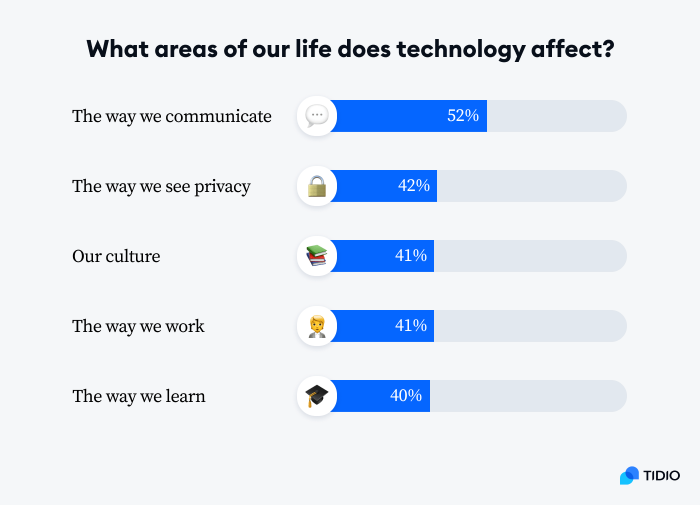
It got to the point where some people start to create an imaginary identity in the virtual world and spend hours every day playing parallel lives. Also, think about those who are using AI companions and bots as their friends. This makes the line between reality and VR blur. Technology is a tool, not a separate being. Yet we give it emotions as if it was alive.
But what if we can’t control the technological effects on us? Are we going to start being controlled by technology instead?
How does technology control our lives?
According to our findings, 47% of people spend three to eight hours every day on their computers and an additional 1 to 3 hours on their phones. Considering we have about 16 waking hours a day, spending more than 10 of them on a technological device seems like a lot, don’t you think?
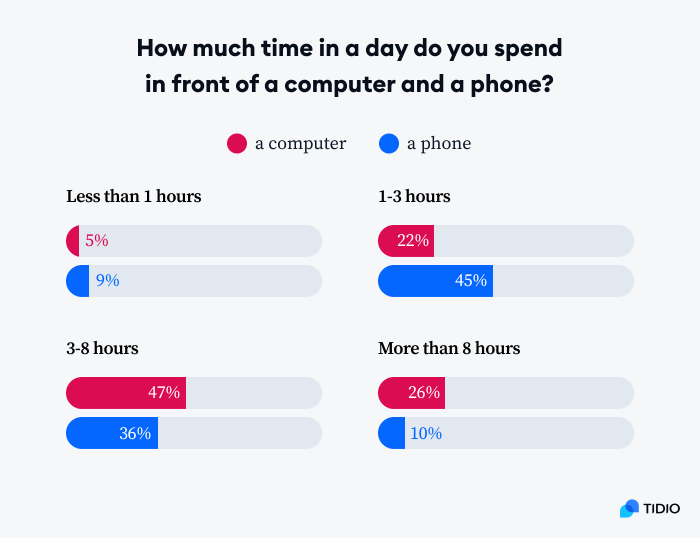
So, should we say that technology controls us and our lives?
Netflix TV series, The Social Dilemma, certainly makes it feel that way!
In 2016, Guardian wrote an article about this phenomenon. It stated that data surveillance that used to be invisible is now aggressively present in our everyday lives. The internet of things creates an unprecedented network of tracking devices that capture our data and use it to create our digital profiles for marketing and political purposes. We know we’re being watched, and it has become normal.
Moreover, in a social psychology book from 1991 book, The Saturated Self, the author wrote about the world where technology-saturated human beings to the point of them becoming a fragmented version of themselves that is pulled in so many directions they get lost.
As we can see above, the internet has a bit of a grip on us. But the world that we see on it is not real. It’s a creation of people who only put their most shiny moments online. However, we sometimes forget this fact and compare ourselves to the happy version of others that we see online. As a result, many people create an imaginary world where everyone is happy except them.
The boundaries regarding what’s real and what’s not are becoming more blurry. In 2017, Guardian published a story of a man who married a robot and only a year later, an article about a man who married a hologram came out. It sometimes feels like a movie Her, don’t you think?
For technology to have a grip on us, we need to be dependent on it. Are we?
Are we dependent on our phones?
A quick answer would be—yes.
We use it for entertainment, and communication, and most of us can’t leave the house without it.
A UK study showed that about 39% of young adults report a smartphone addiction. And our study finds that about 35% of participants report compulsive behavior to fill any momentary boredom with the use of a smartphone. Also, about 19% state they have often experienced hallucinating that their phone is vibrating when it is not.

But smartphones are not the only technology we are addicted to. Research shows that many people agree that social media has a bad impact on society, and they are against the usage of social media. Yet, they use it because modern-day society demands it from them.
Our study found that these two addictions are connected. People who spend more time on their mobile phones online are more likely to believe that social media creates unrealistic beauty expectations. This problem was reported by about 40% of users who spend less than 3 hours a day on their mobile, 49% of users who spend more than 3 hours, and 57% of those who spend more than 8 hours a day on their phones.
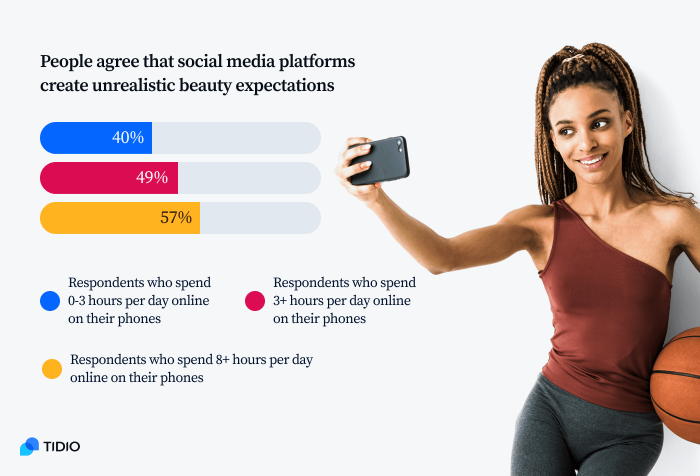
But is it just the younger generation that’s affected because they spend more time on their phone and social media? Do the effects that technology has on us depend on our age? Let’s find out!
Differences between generations
It’s pretty clear when you speak to your grandparents that different generations see technology a little differently.
That’s because being tech-savvy is something that we’re born into. It all depends on which stage of development technology is when we enter the world. This is partly the reason why younger generations are more comfortable with technology than older generations. They simply don’t know the world in any other way.
Younger generations are digital natives as opposed to the older generations who are digital immigrants. That’s why your parents are more hesitant when it comes to engaging in online activities.
Our findings show that about 24% of Baby Boomers use smartphones for less than an hour a day, but only 7% of Millennials do the same.
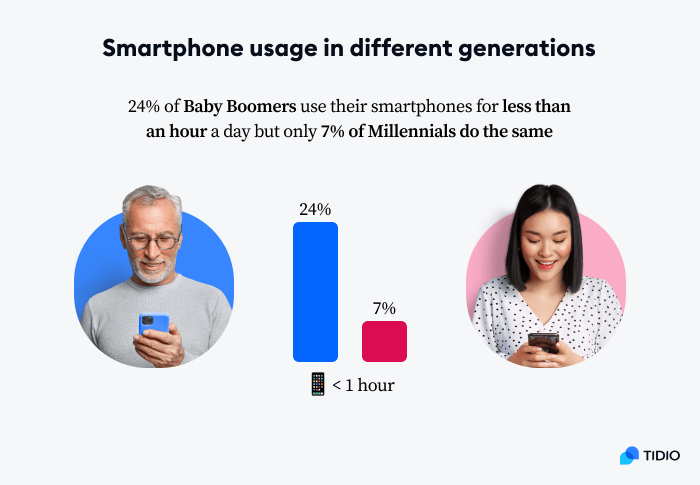
Compared to older generations, Gen Z can’t imagine their life without the internet. And a Norton study found that 40% of Gen Zers think working Wi-Fi is more important than a working bathroom.
Are the youngest users of the web in danger then?
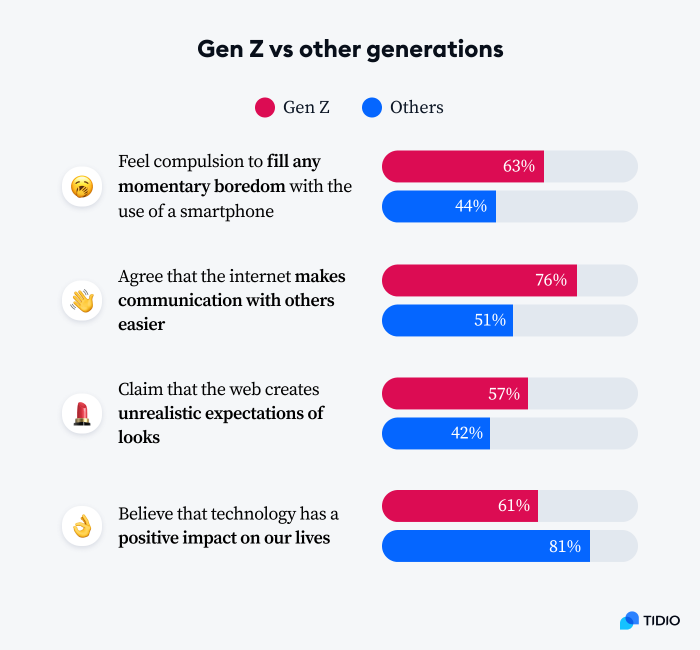
No matter what generation you identify with, technology probably takes a toll on your health to some extent. But it’s not all bad so let’s go through some of the positive impacts of technology.
Positive impacts of technology
Most of the respondents (80%) claim technology has positive effects on our lives or a mixture of good and bad. Only about 10% of participants in our study consider technology to have negative effects on our lives.
According to the participants of our research, technology has improved our lives because we have information at our fingertips (61%), we can communicate easier with others (55%), and we have the freedom to work remotely (48%).
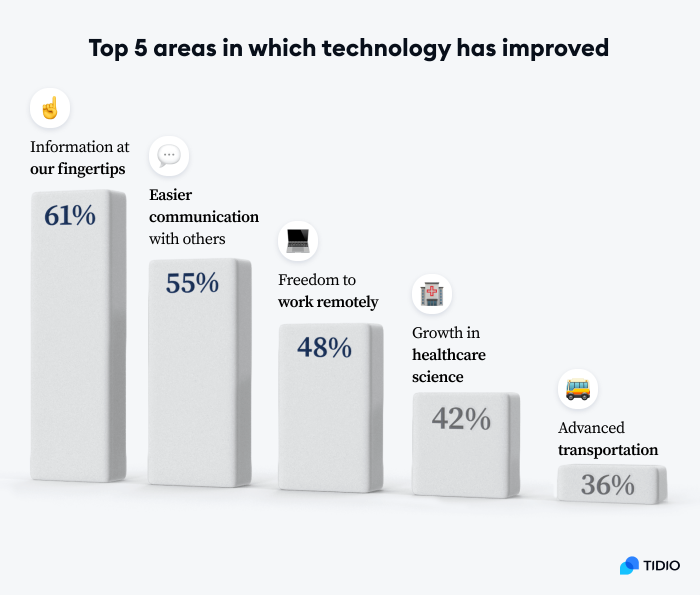
Surprisingly (or maybe not so much), technology can also help with some mental disorders. A study by Hopelab and Well Being Trust suggested that social media is very important for helping young people with symptoms of depression. It helps them express themselves creatively and get inspiration from others, as well as feel less lonely.
Also, a study from the University of Florida found that people who use their smartphones not just for random Internet surfing but for getting to know more people (i.e. via social media) are more involved with charity organizations and actively participate in discussions.
Is technology more harmful or beneficial?
Technology is a bit of both, dangerous and helpful. But how does the scale tip?
Well—it depends on how you use modern technology.
The internet has increased the number of tools we can use to communicate with people. And that was especially important when the pandemic started in 2020 and social distancing was implemented. Technology has become our only way of staying in touch with friends and distant family.
So, let’s put it this way—
Looking at your friends’ posts and not responding will not build connections nor intimacy. It will only cause comparisons. But when we interact with the people and their posts online, we get to connect with them and improve our relationships. We are less likely to compare ourselves to the lives others present online when we see the full picture of their lives.
Many studies have shown that social connections are tied to our mental health. They affect how good we feel and the satisfaction we get from our lives. Research also shows that using social technologies, such as social media, can boost our well-being and help us feel more connected to the people around us.
Online communication – email, instant messaging, chat rooms, etc. – does not replace more traditional offline forms of contact – face-to-face and telephone. Instead, it adds on to them, increasing the overall volume of contact.

We cannot deny the fact that technology has revolutionized the world by accelerating development, increasing equality, and freedom of speech for people. As a result, it increased living efficiency, and undeniably, it’s now crucial to human civilization.
After all, beauty lies in the balance. So make sure you strike the right balance in taking advantage of technology and acting on any effects it might have on your health.
Technological effects on society: conclusion
Smartphones, the internet, and other modern technology greatly affect us as individuals and society as a whole. These include positive as well as negative impacts. We need to be careful not to become dependent on technology and take breaks from it so that the scale doesn’t tip to our disadvantage.
Modern tech has caused many cognitive disorders and we need to learn some practices that will mitigate the negative effects on us. This way, we’ll enjoy the technological benefits in a healthy relationship.
Sources:
- A Brief History of the Internet
- Worldometer
- Survey: Americans spend 23 hours a week online/social media
- Plugged in: How media attract and affect youth
- Digital Health Practices, Social Media Use, and Mental Well-Being Among Teens and Young Adults in the U.S.
- How Important Is Technology in Education? Benefits, Challenges, and Impact on Students
- Why Don’t I Look Like Her? The Impact of Social Media on Female Body Image
- How well does technology solve social problems?
- The impact of technology usage on love and intimacy satisfaction among Portuguese adults
- We let technology into our lives. And now it’s starting to control us
- A Virtual Life: How Social Media Changes Our Perceptions
- Does Technology Connect or Isolate Us?
- Quality time, online: Staying connected with social technologies during the coronavirus outbreak
- Your Phone vs. Your Heart
- Does Technology Cut Us Off from Other People?
- 25 years of the Internet: How it has changed the way we Interact
- Digital generations: The technology gap between seniors, parents, and kids
- Defining generations: Where Millennials end and Generation Z begins
- Generational differences in technology behaviour: Comparing Millennials and Generation X
- The Association Between Smartphone Addiction and Sleep: A UK Cross-Sectional Study of Young Adults
- Depression, anxiety, and smartphone addiction in university students- A cross sectional study
- Digital Responsibility: Taking Control of Your Digital Life
- Brain health consequences of digital technology use
- Can Compulsive Internet Use Affect Adolescent Mental Health?
- How does technology affect mental health?
- Digital technology can be harmful to your health
- Technological Influence on Society
- Beyond dimensions: The man who married a hologram
- Chinese man ‘marries’ robot he built himself
- How free technology is controlling our lives
- The effect of psychiatric symptoms on the internet addiction disorder in Isfahan’s University students
- Scrutinizing the effects of digital technology on mental health
- Positive and Negative Impact of TikTok on Our Mental Health
Methodology:
For this study about how technology changes you, we collected answers from 609 respondents. We used Reddit, Facebook, and Amazon’s Mechanical Turk to distribute the survey and gather responses.
Participants had to answer 15 questions—the majority of which were multiple-choice questions. The survey had an attention check question.
Fair Use Statement:
Has our research helped you learn more about technological effects on society? Feel free to share statistics from this study. Just remember to mention the source and include a link to this page. Thank you!

